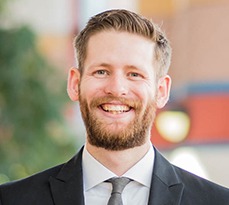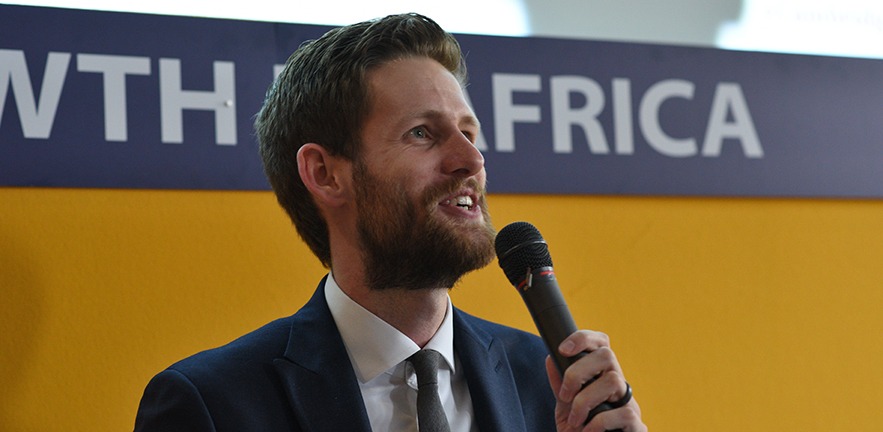Cambridge alumnus Hunter Sims (MBA 2018) shares his career insights after a leap from a finance career in banking in the USA, to heading up Operations at the Cambridge Centre for Alternative Finance at Cambridge Judge Business School.
When Hunter Sims stepped out of his home State of Indiana, USA, to undertake the Cambridge MBA, he didn’t know then that Cambridge would become his home for more than one year, and the location of a fresh direction in his career.
“I have a background in the traditional finance sector, but like a lot of my peers, as time went on I became more and more interested in Private Equity and Venture Capital and so new venture finance seemed a logical way forward for me.
“At the beginning of my Cambridge MBA year I spent some time breaking down what I was interested in. I wanted to look at a career working in emerging markets and frontier markets, and I was getting more interested in entrepreneurship and perhaps VC as a halfway step towards that”
During the Cambridge MBA Hunter built on these interests and added more skills and networks to his tool kit across the busy year in Cambridge.

“From an academic standpoint the guidance I had been given before was to go and get the hard skills. But it is the ‘soft skills’ that I use daily; the negotiations skills and the Management Praxis I & II core courses over the first two terms particularly.
“Going back to the classroom suited me, it is a place to learn, where you can always improve. On the Cambridge MBA you can take an idea, reflect on it and take a couple of months to really work it through.”
Hunter continues, “For instance I thought I was a good communicator, but the Cambridge MBA taught me that I wasn’t as good as I may have thought, and that was enormously useful to develop. The MBA was the best environment to practice communicating more effectively across the year, with practical projects, our class presentations, as well as opportunities beyond the classroom.
“Being in the classroom also opened up my capacity to learn in the future. I now have more tools and frameworks that I can leverage to learn and improve as my career continues.”
In addition, he explains, “The network that you get at Cambridge Judge and the University of Cambridge is phenomenal. I can send out an enquiry and reach out to those who have got that sector experience or specific background and I will get an instant reply, as well as a wide variety of viewpoints on a problem
“The enormous diversity of the class and my cohort meant that I always had great, challenging conversations. It is when I was not ‘working’ at networking that I really began to understand the value of the expertise of my classmates and their global experience. Cambridge for me was about being constantly curious.”
He explains, “It was during my interview day that I thought; ‘If half of these people, that I have met today, are here when I come to Cambridge, then I want to be here.’ The network has 100 per cent delivered against what I had hoped for.”
The year before the Cambridge MBA Hunter had put the corporate banking world on hold, and joined Hope International, a non-profit organisation, operating in Rwanda as a Programme Advisor and Head of Credit for Urwego Bank.
His interest and passion for Africa continued during his MBA year. Hunter joined the Africa Special Interest Group (SIG) from the start of the year and also took the challenging role as Cambridge Business School Club Treasurer.
He was also involved in facilitating the annual Business in Africa Conference led and run by the Cambridge Africa Business Network, alongside class members from both the MBA and MFin programme at CJBS. He was honoured to be asked to stand as Master of Ceremonies at this prestigious annual event.
“The convening power in having all these countries across Africa represented at the conference was really phenomenal.”
By the end of the Cambridge MBA year Hunter had also discovered the many research centres associated with Cambridge Judge, including the Cambridge Centre for Alternative Finance or CCAF.
“I attended the CCAF annual conference last year and then started as an intern across the Summer term, before developing a specific role with the Collaboration Network last September.”
Hunter explains, “I had already met some of the Directors of the Centre across my MBA year, Dr Bob Wardrop and Professor Raghavendra Rau.
“While there was not an open placement at the end of my MBA year, there was a large grant proposal that needed some further financial modelling. I was a good fit at the time, having spent a year in Cambridge already.
“I am very operations and execution focused, which I think has been a good complement to the research expertise within the CCAF. I particularly enjoy the global breadth of the CCAF’s work, with research collaborations in priority regions like Sub-Saharan Africa, Middle-East North Africa, Euro/Med, and Asia-Pacific regions.
“I really believe in the mission of the CCAF, as a research centre focused on creating and transferring knowledge, addressing emergent gaps in tech-enabled financial innovation, in order to support evidence-based decision making by market participants, regulators, and related stakeholders. I think this is essential to unlocking the potential of FinTech in advancing access to finance and enabling financial products and services in emerging markets.”
Hunter expands, “I have never had a job like this, a job where eighteen months down the road it is still interesting and there is still a ton to learn.
“Before the Cambridge MBA I would never have thought about regulation or working within a research centre covering FinTech as a career, but now I think, ‘Why wouldn’t I be here when I was already keen on emerging markets and fintech?’”
On the evolution of his career path overall from the Cambridge MBA Hunter concludes, “Now I have the opposite problem from what I had before. I used to think, ‘How can I do anything that matters in emerging markets and finance?’ Now I am thinking there are so many opportunities, where is the best place to focus.”


